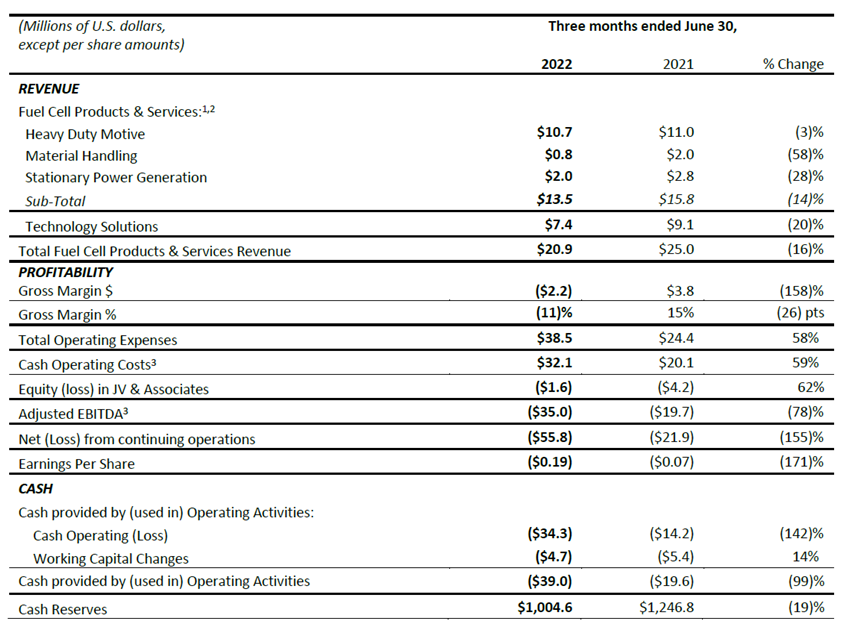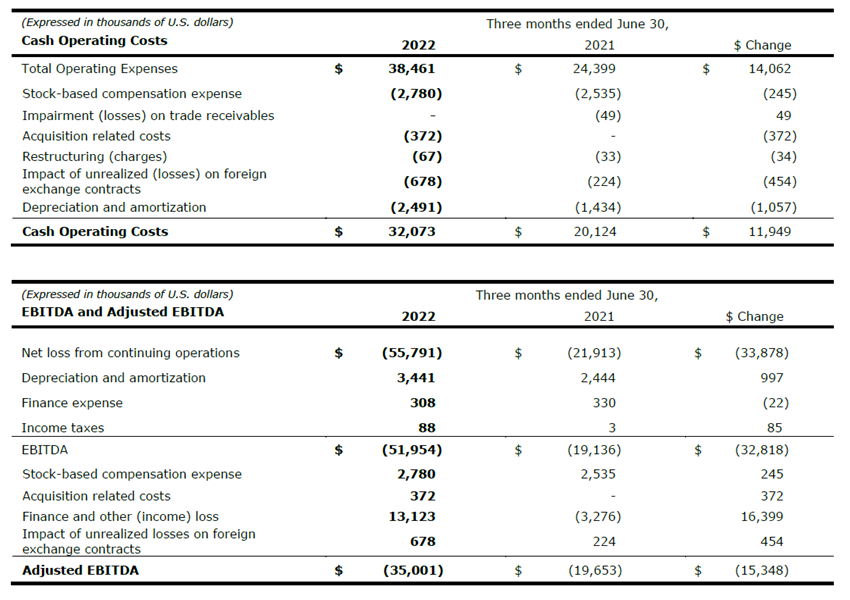VANCOUVER, CANADA – Ballard Power Systems (NASDAQ: BLDP; TSX: BLDP) today announced consolidated financial results for the second quarter ended June 30, 2022. All amounts are in U.S. dollars unless otherwise noted and have been prepared in accordance with International Financial Reporting Standards (IFRS).
“We continue to see policy momentum across the globe to support our vision of decreasing our planet’s emissions. We believe our product offering will make a meaningful impact on the energy transition by enabling our customers with zero emission solutions. This vision is at the forefront of our continued innovation and investment in our business and product offering”, said Mr. Randy MacEwen, President and CEO.
Mr. MacEwen remarked, “In the second quarter, our revenue was $20.9 million, and we secured new orders totaling $12.3 million, driven primarily by stationary power generation and repeat bus customers. We saw continued gross margin compression in the quarter and anticipate continued pressure throughout 2022, but we are confident in our plan to expand margins in the mid- to long-term as we transition to commercial scale production. We ended the quarter with a strong cash balance of $1 billion, which continues to support our technology development programs and other strategic growth initiatives.”
“We are encouraged by our continued progress with platform customers as they advance commercialization of zero-emissions fuel cell solutions in a variety of attractive applications and markets. The European bus market is an example of the growing scale of fuel-cell solutions, with public transport operators in Cologne, Germany and West Midlands, UK announcing plans to deploy additional hydrogen fuel cell bus fleets of 100 and over 120, respectively.”
“Given the challenging macro-economic outlook, we have decreased our planned investments in 2022. As a result, we are revising our total operating expense and capital expenditure guidance downwards from $140 to $160 million to $130 to $150 million, and $40 to $60 million to $30 to $50 million, respectively,” Mr. MacEwen stated. “Notwithstanding the current macro-economic context, we remain confident on the long-term opportunities for hydrogen and fuel cells. We see converging trends driving the energy transition, including net-zero ambitions, low-cost renewable energy, and energy security. At Ballard, we are well positioned with leading fuel cell technology, strong customer and partner relationships, and a solid balance sheet.”
Q2 2022 Financial Highlights
(all comparisons are to Q2 2021 unless otherwise noted)
- Total revenue was $20.9 million in the quarter, down 16% year-over-year.
- Power Products revenue of $13.5 million decreased 14%, driven by lower shipments of fuel cell products.
- Heavy-Duty revenues of $10.7 million decreased by a nominal amount.
- Stationary Power Generation revenues of $2.0 million decreased 28% as a result of lower sales of stationary power generation fuel cell modules, stacks, products and service revenues.
- Material Handling revenues of $0.8 million decreased 58%, primarily as a result of lower shipments to Plug Power.
- Technology Solutions revenue of $7.4 million decreased 20% due primarily to decreased amounts earned on the Weichai Ballard JV and Audi programs.
- Power Products revenue of $13.5 million decreased 14%, driven by lower shipments of fuel cell products.
- Gross margin was (11)% in the quarter, a decrease of 26-points, driven by a combination of a shift to lower overall product margin and service revenue mix including the impacts of pricing strategy, higher fixed overhead costs, higher warranty provisions and adjustments, increase in supply costs, and inventory adjustments.
- Total Operating Expenses and Cash Operating Costs3 were $38.5 million and $32.1 million in the quarter, respectively, an increase of 58% and 59%, respectively. Increases were driven primarily by higher expenditure on research, technology and product development activities. Costs were also higher as a result of increased general and administrative expenses.
- Adjusted EBITDA3 was ($35.0) million, compared to ($19.7) million in Q2 2021, primarily a result of the decrease in gross margin and increase in Cash Operating Costs.
- Ballard received approximately $12.3 million of new orders in Q2, and delivered orders valued at $20.9 million, resulting in an Order Backlog of approximately $91.2 million at end-Q2.
- The 12-month Order Book was $61.4 million at end-Q2, a decrease of $4.3 million from the end of Q1 2022.
| Order Backlog ($M) | Order Backlog at End-Q1 2022 |
Orders Received in Q2 2022 |
Orders Delivered in Q2 2022 |
Order Backlog at End-Q2 2022 |
| Total Fuel Cell Products & Services |
$99.8 | $12.3 | $20.9 | $91.2 |

2022 Outlook
Ballard is revising its 2022 Total Operating Expense4 and Capital Expenditure5 guidance downwards as follows:
|
2022 |
Previous Guidance |
Revised Guidance |
|
Total Operating Expense4 |
$140 – $160 million |
$130 – $150 million |
|
Capital Expenditure5 |
$40 – $60 million |
$30 – $50 million |
Q2 2022 Financial Summary

For a more detailed discussion of Ballard Power Systems’ second quarter 2022 results, please see the company’s financial statements and management’s discussion & analysis, which are available at www.ballard.com/investors, www.sedar.com and www.sec.gov/edgar.shtml.
Conference Call
Ballard will hold a conference call on Wednesday, August 10, 2022 at 8:00 a.m. Pacific Time (11:00 a.m. Eastern Time) to review second quarter 2022 operating results. The live call can be accessed by dialing +1.604.638.5340. Alternatively, a live audio and webcast can be accessed through a link on Ballard’s homepage (www.ballard.com). Following the call, the audio webcast and presentation materials will be archived in the ‘Earnings, Interviews & Presentations’ area of the ‘Investors’ section of Ballard’s website (www.ballard.com/investors).
About Ballard Power Systems
Ballard Power Systems’ (NASDAQ: BLDP; TSX: BLDP) vision is to deliver fuel cell power for a sustainable planet. Ballard zero-emission PEM fuel cells are enabling electrification of mobility, including buses, commercial trucks, trains, marine vessels, and stationary power. To learn more about Ballard, please visit www.ballard.com.
Important Cautions Regarding Forward-Looking Statements
This release contains forward-looking statements concerning the hydrogen economy and markets for our products and the effects of governmental regulations on such markets, expected revenues, operating expenses, capital expenditures, corporate development activities, impacts of investments in manufacturing and R&D capabilities and market growth, and our carbon emissions goals. These forward-looking statements reflect Ballard’s current expectations as contemplated under section 27A of the Securities Act of 1933, as amended, and Section 21E of the Securities Exchange Act of 1934, as amended. Any such statements are based on Ballard’s assumptions relating to its financial forecasts and expectations regarding its product development efforts, manufacturing capacity, and market demand. For a detailed discussion of the factors and assumptions that these statements are based upon, and factors that could cause our actual results or outcomes to differ materially, please refer to Ballard’s most recent management discussion & analysis. Other risks and uncertainties that may cause Ballard’s actual results to be materially different include general economic and regulatory changes, detrimental reliance on third parties, successfully achieving our business plans and achieving and sustaining profitability. For a detailed discussion of these and other risk factors that could affect Ballard’s future performance, please refer to Ballard’s most recent Annual Information Form. These forward-looking statements are provided to enable external stakeholders to understand Ballard’s expectations as at the date of this release and may not be appropriate for other purposes. Readers should not place undue reliance on these statements and Ballard assumes no obligation to update or release any revisions to them, other than as required under applicable legislation.
Further Information
Kate Charlton +1.604.453.3939, investors@ballard.com or media@ballard.com
Endnotes
1 We report our results in the single operating segment of Fuel Cell Products and Services. Our Fuel Cell Products and Services segment consists of the sale and service of PEM fuel cell products for our power product markets of Heavy Duty Motive (consisting of bus, truck, rail and marine applications), Material Handling and Stationary Power Generation, as well as the delivery of Technology Solutions, including engineering services, technology transfer and the license and sale of our extensive intellectual property portfolio and fundamental knowledge for a variety of fuel cell applications.
2 The UAV market has been classified as a discontinued operation in our third quarter of 2020 consolidated condensed financial statements. As such, the assets of the UAV market have been classified as assets held for sale as of September 30, 2020. Furthermore, the historic operating results of the UAV market for 2020 have been removed from continuing operating results and are instead presented separately in the statement of comprehensive income as income from discontinued operations.
3 Note that Cash Operating Costs, EBITDA, and Adjusted EBITDA are non-GAAP measures. Non-GAAP measures do not have any standardized meaning prescribed by GAAP and therefore are unlikely to be comparable to similar measures presented by other companies. Ballard believes that Cash Operating Costs, EBITDA, and Adjusted EBITDA assist investors in assessing Ballard’s operating performance. These measures should be used in addition to, and not as a substitute for, net income (loss), cash flows and other measures of financial performance and liquidity reported in accordance with GAAP. For a reconciliation of Cash Operating Costs, EBITDA, and Adjusted EBITDA to the Consolidated Financial Statements, please refer to the tables below.
Cash Operating Costs measures operating expenses excluding stock-based compensation expense, depreciation and amortization, impairment losses or recoveries on trade receivables, restructuring charges, acquisition related costs, the impact of unrealized gains or losses on foreign exchange contracts, and financing charges. EBITDA measures net loss from continuing operations excluding finance expense, income taxes, depreciation of property, plant and equipment, and amortization of intangible assets. Adjusted EBITDA adjusts EBITDA for stock-based compensation expense, transactional gains and losses, asset impairment charges, finance and other income, the impact of unrealized gains or losses on foreign exchange contracts, and acquisition related costs.
4 Total Operating Expenses refer to the measure reported in accordance with IFRS.
5 Capital Expenditure is defined as Additions to property, plant and equipment and Investment in other intangible assets as disclosed in the Consolidated Statements of Cash Flows


